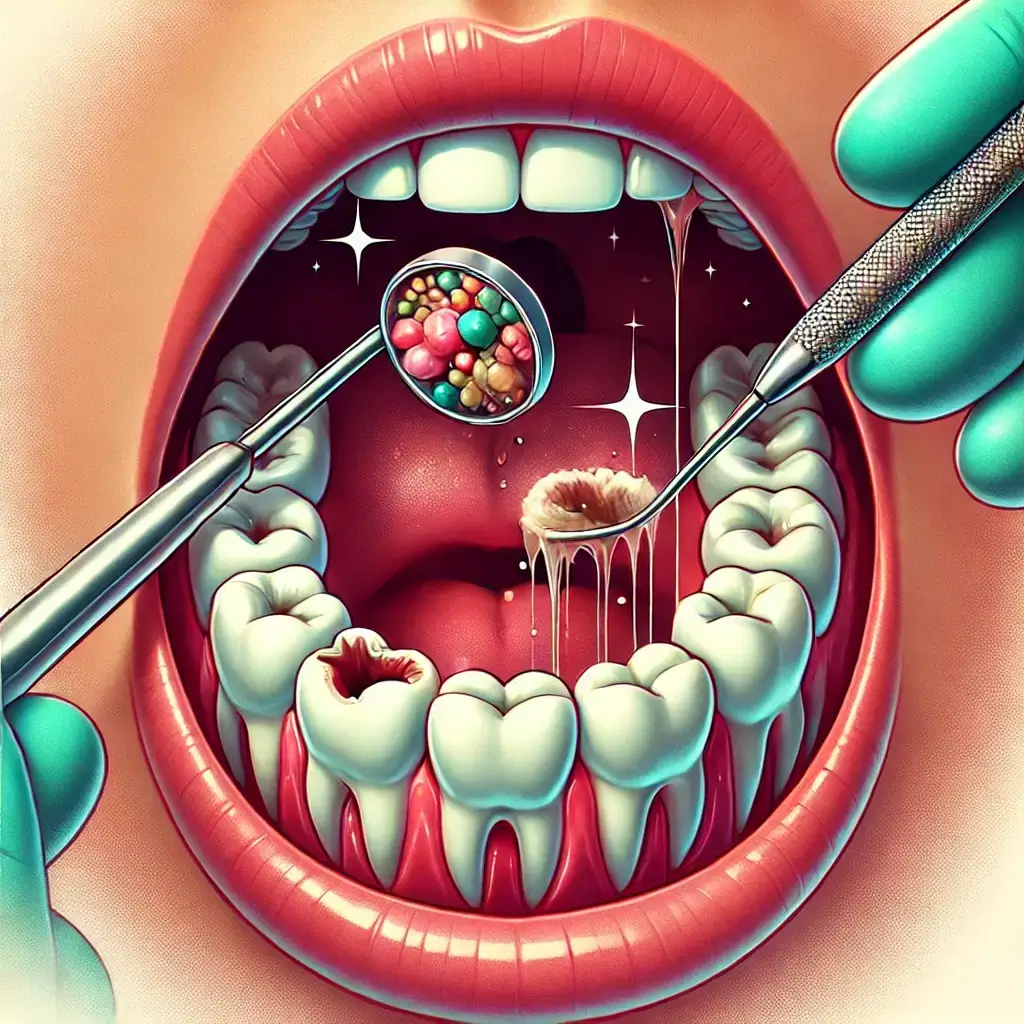What to Know About the Recovery Process After Wisdom Teeth Removal
Having your wisdom teeth removed is a common dental operation that millions undergo, but one issue that remains afterward is having food stuck in the empty cavities. If you're wondering, "When can I stop concerning about food stuck in wisdom teeth cavities?" the answer isn't one-size-fits-all—it depends on your own healing process, your attention to oral care, and the care you take post-surgery. This guidebook explores in detail the stages of recovery, giving real-world information to soothe your mind and ensure the recovery process is as problem-free as can be.
What to Expect After Wisdom Teeth Removal?
When your wisdom teeth have been extracted, your body begins to heal itself in this amazing manner. The holes left by the sockets don't just fill up instantly—after a while, they change slowly. Blood clots begin to form within hours and days atop the exposed bone and nerves, and it creates a type of natural dressing to initiate healing. But these empty spaces are the ideal locations for food to become lodged, leading to discomfort, bacterial proliferation, or throbbing complication of dry socket when the clot is disturbed. So, when can I stop concerning about food stuck in wisdom teeth cavities? Full healing will occur between a few weeks to a few months, depending on how old you are, how healthy you are, and how well you'll follow post-op instructions. Understanding this keeps you patient and proactive as your mouth heals. If you're still asking yourself, "When can I stop concerning about food stuck in wisdom teeth cavities?" read on for a clearer timeline.
How Long Until Wisdom Teeth Sockets Seal Up?
The duration for closure of sockets largely varies with the individual situation, but here's a detailed description of the process most people undergo:
Week 1: Clot Formation Stage
The clots harden in the sockets within the first 24-48 hours, creating a protective sheath.
This phase is most vulnerable, with highest risk of dry socket—a situation where the clot is pulled out, leaving exposed sensitive tissue.
To guard healing, avoid using straws, smoking, hard spitting, or engaging in activities that create suction in your mouth.
Here, "When can I stop concerning about food stuck in wisdom teeth cavities?" is still not answerable—there is still some care required. If you are concerned, "When can I stop concerning about food stuck in wisdom teeth cavities?" is a pertinent question here.
Week 2-3: Gum Tissue Recovery
Soft gum tissue will begin to form along the edges of the sockets, slowly narrowing the holes.
You might still notice the holes are present, i.e., food can still get stuck, so care is still necessary. If you find yourself asking, "When can I stop concerning about food stuck in wisdom teeth cavities?" you will likely have to wait a few more weeks.
Delicate rinsing now becomes essential to clean out the area without disturbing healing tissue.
Week 4-6: Bone Regrowth Starts
Below the gums, bone regeneration starts to fill the socket from the bottom up.
The holes remain open to some degree, but much less so, and therefore food entrapment becomes less frequent but not impossible. Postprandial rinsing helps to contain this risk.
By this time, most experience improvement, although the question "When can I stop concerning about food stuck in wisdom teeth cavities?" can take a while until resolution.
Week 6 and Beyond: Final Closure
By this time, the sockets typically become filled with new bone, and the gum covers over completely in most cases.
For the majority, "When can I stop concerning about food stuck in wisdom teeth cavities?" is not an issue anymore because the danger is reduced significantly.
But more profound sockets or slower healers can take up to 3-6 months to recover completely, so endurance is necessary.
Why Does Food Get Stuck in Wisdom Teeth Sockets?
Food gets stuck in these extraction sites because the sockets are deep, crater-like holes that do not disappear immediately after surgery. This issue is especially prevalent in the initial weeks when the gums have not yet covered the openings, leaving them exposed to whatever you consume.
Common Causes of Food Trapping:
Open Cavities: The sockets are open until the gum tissue covers them entirely, offering a location for particles to get stuck.
Sticky or Hard Foods: Rice, small seeds, nuts, or crusty bread crumbs are notorious for getting stuck in these crevices.
Poor Cleaning: Not rinsing well or skipping after-meals care permits debris to build up, increasing risk of irritation.
Socket Location: Lower wisdom teeth sockets are harder to clean, as well as being put in the way by gravity and where the sockets are located in the mouth, as a result. Being aware of these conditions can help you act preemptively when questioning, "When can I stop concerning about food stuck in wisdom teeth cavities?"
How to Keep Food from Trapping in Wisdom Teeth Sockets
If you're halfway through recovery and keeping asking, "When can I stop concerning about food stuck in wisdom teeth cavities?" taking these preventative actions can reduce your worry period:
Avoid Hard Foods in the Early Stages
During the first two weeks, adhere to mushy, soft foods such as pureed vegetables, pudding, protein shakes, oatmeal, or broth. These reduce the likelihood of debris getting stuck in the sockets.
Stay away from hard, crunchy foods such as chips, hard meats, or sticky sweets such as caramel, which adhere to healing surfaces.
Clean Your Mouth Well
Gently rinse with warm saltwater (1 teaspoon of salt in a cup of water) after meals to flush out particles. Start this 24 hours post-surgery to avoid dislodging clots.
Stay away from aggressive swishing and spitting since this can dislodge the healing clot.
Most dentists provide a curved-tip syringe after week 1 to properly rinse out the sockets—be gentle and use it to loosen stubborn fragments.
Establish Good Dental Habits
Gently brush along the extraction areas with a soft-bristled toothbrush 24 hours after surgery and onward, but not directly over the sockets initially.
Avoid the urge to use alcoholic mouthwashes since they will sting or dehydrate the healing tissue, taking longer to heal.
Do not floss or use toothpicks at the areas to induce irritation or loosening of the clot.
What to Do When Food Is Trapped in Wisdom Teeth Sockets
Despite taking good care, food will manage to get into those sockets. Don't panic if this happens—here's what to do:
Rinse with Warm Saltwater: A mild mouth rinse can release and dislodge food particles without irritating the healing area. Do this several times until clear.
Use a Syringe: If your dentist gave you an irrigation syringe, fill it with saltwater and use it carefully to spray into the socket to flush out debris. This is especially helpful after week 1.
Avoid Sharp Objects: Steer clear of poking the area with fingers, toothpicks, or anything else sharp—these will introduce bacteria or cause damage to delicate tissue, resulting in infection.
Visit a Dentist if Necessary: Ongoing pain, swelling, or bad taste could be a sign of infection or dry socket. If this occurs, call your dentist immediately for an appointment.
These steps can reduce the frustration until the day you can ask, "When can I stop concerning about food stuck in wisdom teeth cavities?" and get a reassuring answer.
When Can I Stop Worrying About Food Getting Stuck in Wisdom Teeth Holes Completely?
For most people, the worry about food getting stuck reduces significantly by weeks 6-8, when the sockets begin to close and heal. Full closure of the socket and bone healing, however, can take anywhere from 3-6 months, especially in the case of more extensive extractions or complex cases. If you're wondering, "When can I stop concerning about food stuck in wisdom teeth cavities?" this time period gives you a benchmark, although your own case may vary. Wondering "When can I stop concerning about food stuck in wisdom teeth cavities?" Look at the factors below.
Factors Influencing Recovery Time:
Age: Young adults and teenagers recover faster since their cells regenerate more energetically.
Health Condition: Good immune health and overall health accelerate the repair of tissues.
Dental Hygiene: Regular, gentle brushing prevents setbacks like infections that prolong the time to recover.
Habits: Smoking, e-smoking, or heavy drinking may delay the process by hindering blood flow and subjecting the tissue to infection.
Extraction Difficulty: Impacted or surgically removed wisdom teeth may result in larger sockets that heal more slowly.
Final Thoughts
When, then, can I relax about food lodging in wisdom teeth holes? It depends on how well you tend to those healing sockets. By 6-8 weeks, the risk diminishes for everyone, as long as you've remained complication-free. Absolute reassurance might come a few months down the road when the bone becomes hardened, but following a soft diet, good rinsing, and the advice of your dentist will prepare the way for a complication-free recovery. If there are still questions—like, "When can I stop concerning about food stuck in wisdom teeth cavities?" still lingering in your mind—a brief visit to your dentist will affirm you that your sockets are closing properly and that you may continue without worry. For those who still ask, "When can I stop concerning about food stuck in wisdom teeth cavities?" have faith in the process and in your oral care regimen.
Here Are 20 Important Tips to Maintain Healthy Teeth and Gums:
Oral Care on a Daily Basis
Brush Twice Daily – Brush with fluoride toothpaste and for at least two minutes per session for effective cleaning.
Floss Every Day – Flossing dislodges plaque and food debris between teeth, where your brush can't reach.
Mouthwash Rinse – An antibacterial mouthwash kills bacteria, fights plaque, and eliminates bad breath.
Replace Toothbrushes Every 3 Months – Dull bristles are less effective, leaving teeth less clean.
Clean Your Tongue – Use a scraper or brush to remove bacteria buildup and prevent bad breath.
Dietary Habits
Reduce Sugar – Sweets and sodas feed cavity-causing bacteria, which damage teeth and gums.
Consume Nutrient-Dense Foods – Stock up on calcium from milk, leafy greens, and nuts to harden enamel and bone.
Stay Hydrated – Water rinses away debris, moistens the mouth, and supports saliva production.
Limit Acidic Items – Fruits and veggies that are high in acid, bubbly drinks, and coffee erode enamel gradually—consume in moderation.
Chew Sugarless Gum – It stimulates saliva, which neutralizes acids and washes away food particles.
Regular Dental Care
Go See the Dentist Every Six Months – Catch cavities, gum disease, or other issues before they become big problems.
Select Cleanings – Professional scaling removes tartar and plaque that home brushing misses.
Utilize Fluoride Treatments – They harden enamel, making teeth stronger against tooth decay.
Utilize Sealants – A barrier coating on molars shields them from bacteria and food particles.
Watch Out for Gum Issues – Redness, swelling, or bleeding gums are a sign of a problem—don't ignore them.
Lifestyle Habits
Steer Clear of Tobacco – Tobacco smoking or chewing stains teeth, demineralizes gums, and raises oral cancer risk.
Prevent Clenching and Grinding – Use a night guard if you grind or clench at night to protect enamel.
Cut Back on Alcohol – Too much drinking dries out your mouth, promotes bacteria and gum disease.
Don't Abuse Your Teeth – Avoid biting nails, opening packages, or cracking nuts with your teeth.
Manage Stress – Grinding or clenching due to stress can wear down teeth over time.
Adopt these habits, and your gums and teeth will be healthy and strong for years to come!




